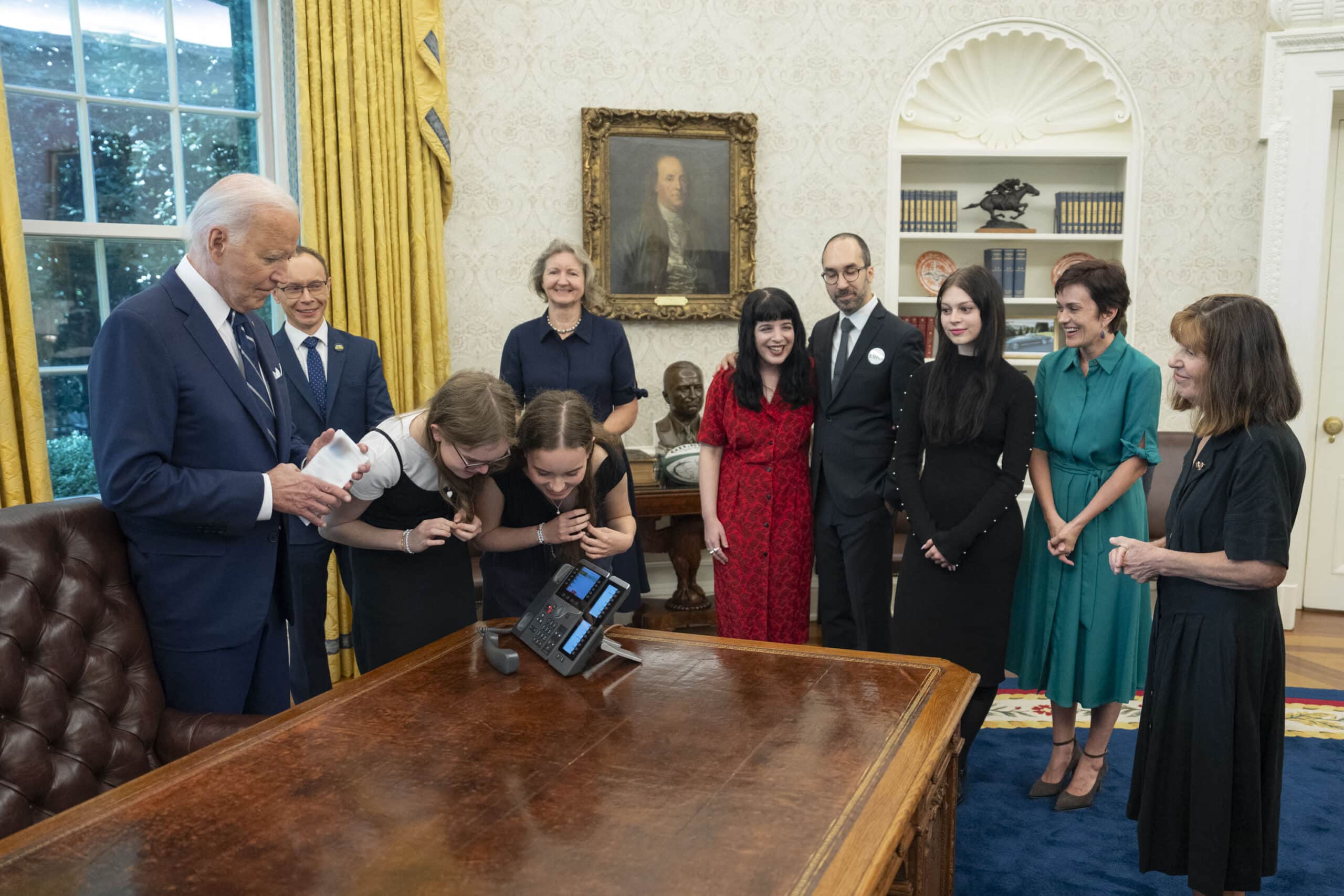
In this image released by the White House, US President Joe Biden (L), with prisoners’ relatives, watches as sisters Miriam (3rd L) and Bibi Butorin speak with their mother, released prisoner journalist Alsu Kurmasheva, in the Oval Office of the White House in Washington DC, on August 1, 2024. AFP
MOSCOW/ANKARA/WASHINGTON—US journalist Evan Gershkovich and ex-US Marine Paul Whelan arrived in the United States before midnight of Thursday, hours after being freed from Russia in the biggest prisoner exchange between the two countries since the Cold War.
The White House said it negotiated the trade with Russia, Germany and three other countries. The deal, worked on in secrecy for more than a year, involved 24 prisoners—16 moving from Russia to the West and eight sent back to Russia from the West.
They included Vadim Krasikov, convicted of murdering an exiled dissident in Berlin, the German government said.
US President Joe Biden hailed the deal as “a feat of diplomacy and friendship” and praised Washington’s allies for their “bold and brave decisions.”
Biden and Vice President Kamala Harris, buoyed by the occasion, greeted freed Americans Gershkovich, Whelan and Russian-American journalist Alsu Kurmasheva, as well as Russian dissident and US resident Vladimir Kara-Murza, as they arrived at Joint Base Andrews in Maryland.
Victory for Putin
The president took off his lapel pin and gave it to Whelan as he got off the Bombardier Global 7500 aircraft.
The deal gives the Biden-Harris administration a marquee diplomatic success with the presidential campaign, pitting Harris against Republican former President Donald Trump. Russian President Vladimir Putin met the prisoners returning to Russia on their arrival in Moscow, saying they would be given state awards.
The exchange also represents a victory for Putin, who had indicated that he wanted Krasikov back.
Krasikov is a colonel in the Russian FSB security service who was serving a life sentence for murdering an exiled Chechen-Georgian dissident in a Berlin park.
Critics said freeing Russians convicted of serious crimes could encourage more hostage-taking by US foes.
Trump, who said he did not have details of the swap, asked whether “murderers, killers, or thugs” were released.
“Just curious because we never make good deals, at anything, but especially hostage swaps,” the presidential nominee said on social media.
The last major exchange between the United States and Russia was in 2010 and it involved 14 prisoners.
The two countries had a high-profile exchange in December 2022, swapping US basketball star Brittney Griner—sentenced to nine years for vape cartridges containing cannabis oil in her luggage—with arms dealer Viktor Bout, who was serving a 25-year sentence.
‘This is Momma’
Among the Westerners freed, Gershkovich, a Wall Street Journal reporter, was accused of collecting sensitive military information for the Central Intelligence Agency, a charge he and the newspaper denied.
The White House posted an emotional two-minute video of the moment the families of the US-bound detainees spoke to their loved ones by phone from the Oval Office.
“This is Momma. Do you hear me? It’s your mom,” Gershkovich’s mother tells her son in the clip, posted on Biden’s social media account on X.
Hours later, Gershkovich scooped her up and lifted her in the air as they met on the tarmac while other family members cheered for joy.
Whelan was serving a 16-year sentence in a Russian penal colony on espionage charges that he denied.
Rico Krieger, a German, had been sentenced to death in Belarus on terrorism charges. He was pardoned by President Alexander Lukashenko, a close Putin ally, before being freed.
Also released were human rights activist Oleg Orlov and Russian opposition politician Ilya Yashin.
Many of those freed had worked with Alexei Navalny, Russia’s leading opposition figure who died in unclear circumstances in an Arctic penal colony in February.
Navalny was meant to have been part of the exchange, according to Biden’s national security adviser, Jake Sullivan.
Painstaking, secret talks
The historic prisoner swap with Russia was the fruit of painstaking, secret talks—and one crucial phone call from Biden an hour before he dropped his reelection bid.The White House had worked desperately—and largely out of public view—to free Gershkovich, Whelan, Kurmasheva and Kara-Murza, a US green card holder.
This meant not only high-level talks with Russia but also leaning hard on European allies, who were reluctant to accommodate Moscow’s demands for getting back Russians detained in the West for serious crimes.
In the end, Biden secured the key piece of the puzzle on July 21—the very day that he stunned the world by announcing that he was dropping his reelection bid.
Holed up in his Delaware beach home with COVID-19, he was about to release his shock statement but had one more bit of work to do on the prisoner deal.
“I’m not making this up—literally an hour before he released that statement, he was on the phone with his Slovenian counterpart, urging them to make the final arrangements and to get this deal over the finish line,” a senior US official said.
Slovenia later freed two of the Russians, who had been convicted by a court of espionage and using fake identities.
Also returned to Russia were Roman Seleznev and Vladislav Klyushin—both convicted of cybercrimes—and Vadim Konoshchenok. All three were released from the United States.
READ: Russia frees US reporter, Marine in major prisoners swap with West
Germany balked at giving up Krasikov. According to Sullivan, persuading Berlin “required extensive diplomatic engagement.”
The breakthrough came during Oval Office talks in April between Biden and German Chancellor Olaf Scholz.
Sullivan quoted Scholz as telling Biden: “For you, I will do this.”
Turkey coordinated the exchange of prisoners and Norway and Poland were also involved.